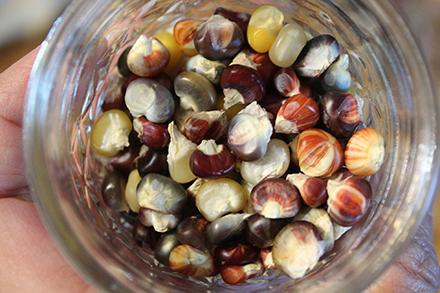ARS Project Supports Indigenous Seed Sovereignty

USDA’s Agricultural Research Service (ARS) is helping ensure that native plants with cultural, historical, medicinal, and edible significance remain available for future generations.
Scientists with the ARS Northern Great Plains Research Laboratory (NGPRL) in Mandan, North Dakota, are collaborating with two neighboring Tribal land grant colleges, Nueta Hidatsa Sahnish College (NHSC) and United Tribes Technical College (UTTC), to expand the growth of heritage corn varieties and consolidate knowledge of culturally significant plants in the region.
According to Ruth Plenty Sweetgrass-She Kills, director of food sovereignty at NHSC, the Mandan, Hidatsa, and Arikara peoples have many varieties of heritage corn seed, but are limited by access to land and other resources to growing one variety per year at a large scale.
The research lab is supporting NHSC’s goal of providing traditional seeds to their Tribal members as part of their seed sovereignty. ARS is also assisting in UTTC’s investigation of culturally sensitive propagation techniques for plants that require additional research. Both colleges are involving the community in their efforts.
“This project synthesizes the strengths of both Tribal colleges and ARS to maximize benefits to the Tribal communities,” Plenty Sweetgrass-She Kills said. “Students are involved as much as possible; that is a key aspect and one of the most exciting parts of this collaboration.”
Partnering together, ARS and both Tribal colleges work to preserve these native plants and seed varieties so their legacy can continue. These efforts not only safeguard the heritage of Tribal communities in the Great Plains, but also the biodiversity of this area.
“The Great Plains are an incredible unknown and underappreciated plant diversity storehouse,” Plenty Sweetgrass-She Kills said.
“ARS hopes to use this pilot project as a model to replicate for Tribal college research relationships celebrating Indigenous knowledge throughout our ARS research facilities,” said Simon Liu, ARS acting administrator.


